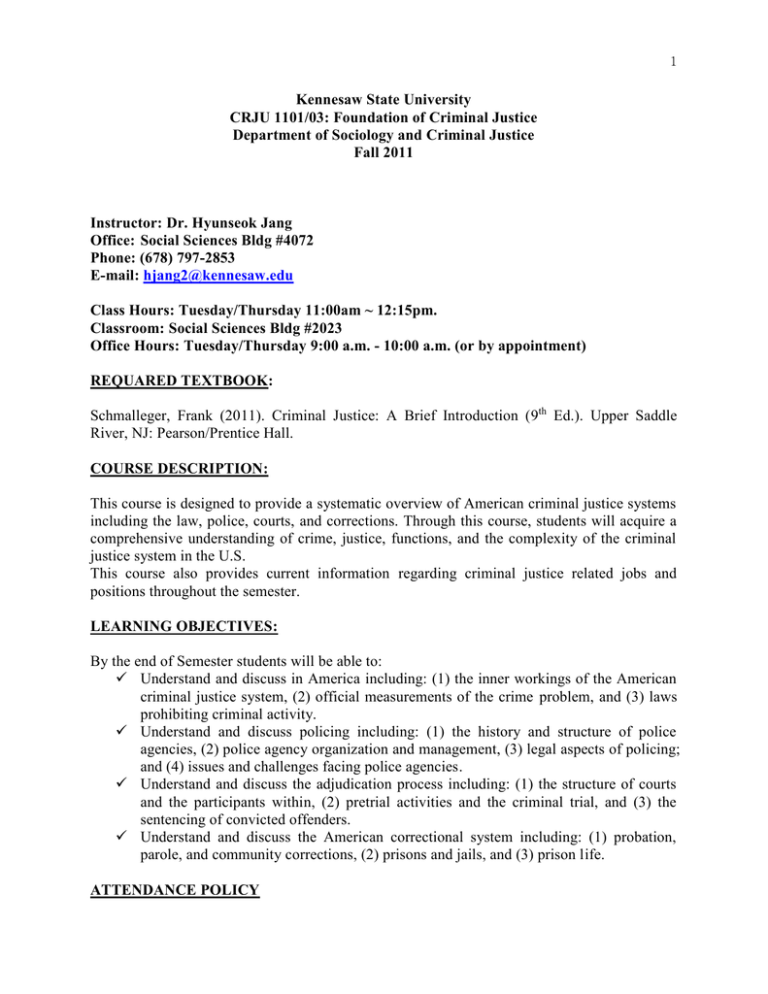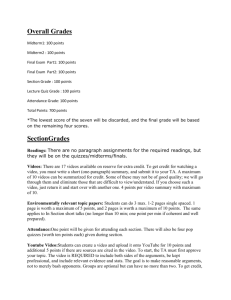
1
Kennesaw State University
CRJU 1101/03: Foundation of Criminal Justice
Department of Sociology and Criminal Justice
Fall 2011
Instructor: Dr. Hyunseok Jang
Office: Social Sciences Bldg #4072
Phone: (678) 797-2853
E-mail: hjang2@kennesaw.edu
Class Hours: Tuesday/Thursday 11:00am ~ 12:15pm.
Classroom: Social Sciences Bldg #2023
Office Hours: Tuesday/Thursday 9:00 a.m. - 10:00 a.m. (or by appointment)
REQUARED TEXTBOOK:
Schmalleger, Frank (2011). Criminal Justice: A Brief Introduction (9th Ed.). Upper Saddle
River, NJ: Pearson/Prentice Hall.
COURSE DESCRIPTION:
This course is designed to provide a systematic overview of American criminal justice systems
including the law, police, courts, and corrections. Through this course, students will acquire a
comprehensive understanding of crime, justice, functions, and the complexity of the criminal
justice system in the U.S.
This course also provides current information regarding criminal justice related jobs and
positions throughout the semester.
LEARNING OBJECTIVES:
By the end of Semester students will be able to:
Understand and discuss in America including: (1) the inner workings of the American
criminal justice system, (2) official measurements of the crime problem, and (3) laws
prohibiting criminal activity.
Understand and discuss policing including: (1) the history and structure of police
agencies, (2) police agency organization and management, (3) legal aspects of policing;
and (4) issues and challenges facing police agencies.
Understand and discuss the adjudication process including: (1) the structure of courts
and the participants within, (2) pretrial activities and the criminal trial, and (3) the
sentencing of convicted offenders.
Understand and discuss the American correctional system including: (1) probation,
parole, and community corrections, (2) prisons and jails, and (3) prison life.
ATTENDANCE POLICY
2
In order to improve student learning, this class expects students to attend every class
throughout the semester. Students will be given an excused absence when acting as an official
representative of the university, provided you give prior written verification from the
faculty/staff supervisor of the event. If a student is not able to attend a class for reasons that
approved by the University or the instructor, such as a medical emergency, illness, death in the
family, etc, it is expected that he/she will notify the instructor ASAP. All other absences will
be deemed unexcused. This class has an attendance grade (see below D. Attendance Grade).
If students miss more than 14 class sessions (including excused and unexcused together),
they will get F automatically.
GeorgiaVIEW-Vista and E-mail
Students need to login to their WebCT account. In the WebCT, students can find assignments,
grades, and additional information for the class.
Communication will be done through the University E-mail or Georgia VIEW E-mail
account. Students have a responsibility to check e-mail regarding the course information
regularly. Instructor does not know students’ other e-mail accounts.
COURSE REQUIREMENTS:
A. Mid & Final Examinations (160 points)
There will be two written examinations (80 points x 2 = 160 points).
Each exam will be consist of
I. Multiple choice questions or short answer (40 points)
II. Short Essay Paper (40 points)
B. Quizzes (100 points)
There will be 6 quizzes throughout the course (see “Course Schedule” for dates). Each quiz
consists of 20 questions (true/false questions, multiple choice questions, or short answer
questions) and each question will be worth 1 points. In the calculation of final grade, I will
drop one poor quiz score out of 6 quizzes and consider 5 quiz scores. Thus, possible total quiz
points in the end of semester will be 100 (20 points x 5 quizzes). The total quiz points will be
applied toward your final semester grade.
C. Activities & Discussions (100 points)
Students are expected to actively participate in the weekly activities and discussions. For each
activity or discussion, students are expected to create at least one of their own answers or
opinions (By Tuesday of each week) and at least 2 responses to other students’ opinion (by
Thursday) in the GegorgiaVIEW discussion board. GeorgiaVIEW discussion will be
continued during the class time for each week. Based on the number of participation and
quality of discussion in the WebCT and Class session (just saying “I agree” or “I disagree” is
not enough. You need to provide a critical thought to other student’s opinion), students will get
up to total 100 points in their final scores.
D. Attendance Grade (40 points)
Attendance will be checked in the beginning of the class. Three absences will be excused
3
without asking reasons. From the forth absence, each unexcused absence will result in 5 points
deduction from the 40 attendance points. If students miss more than 14 classes (including
excused and unexcused), they will receive F automatically. Emergency & unavoidable
conditions can be considered with the appropriate document or explanation.
E. Grading
Possible highest point:
Points
400 - 360
359 - 320
319 - 280
279 – 240
239 or below
400
Semester Grade
A
B
C
D
F
F. Make-Up & Late Assignment Policy
1) Quizzes
If students miss quizzes only with a legitimate excuse, they are allowed to take make-up
quizzes. All make-up quizzes should be taken within 2 weeks after the missing. Legitimacy
will be determined by the instructor. Students who want to take make-up quizzes are required
to talk to the instructor regarding time and date. There will be 2 point deduction from the score.
2) Assignments & Exams
If students submit assignments and exams after the due date, there will be 5 points reduction
from the possible points.
ACADEMIC HONESTY:
Every KSU student is responsible for upholding the provisions of the Student Code of Conduct,
as published in the Undergraduate and Graduate Catalogs. Section III of the Student Code of
Conduct addresses the University’s policy on academic honesty, including provisions regarding
plagiarism
and
cheating,
unauthorized
access
to
University
materials,
misrepresentation/falsification of University records or academic work, malicious removal,
retention, or destruction of library materials, malicious or intentional misuse of computer
facilities and/or services, and misuse of student identification cards. Incidents of academic
misconduct will be handled through the established procedures of the University Judiciary
Program, which may include an informal resolution by a faculty member resulting in a grade
adjustment or a formal hearing procedure, which may subject the student to the minimum onesemester suspension required by the Code of Conduct.
Cheating or plagiarism in any form will result in a grade of F for the course. In addition, a
report of the incident will be filed with the Office of Student Conduct and Academic Integrit y.
USE OF ELECTRONIC DEVICES & DISRUPTIONAL BEHAVIOR:
Students are not permitted to use cell phones or other electronic devices during class. Laptop
computers may be used ONLY for the purpose of taking notes. The instructor reserves the right
4
at any time to observe the screen content of any laptop used during class. If content other than
class notes is visible, the student will be required to shut off the laptop and will not be allowed
to use it in class thereafter.
Tabaco and foods (except drinks) are not allowed during the class. If student’s behavior causes
a serious disruption, that student can be dismissed from the class session.
DISABLED STUDENT POLICY
Students with a disability which affects their academic performance are expected to arrange for
a conference with the instructor in order that appropriate strategies can be considered to ensure
that participation and achievement opportunities are not impaired.
Please feel free to discuss any particular need you may have with your professor.
5
COURSE SCHEDULE
Date
Topics
GeorgiaVIEW/Quiz
Week 1
Syllabus review
(8/18 ~ 8/19)
Preparation for the class
Week 2
Ch.1 What is Criminal Justice?
Week 2
(8/22 ~ 8/26)
Week 3
CJ Careers
Week 1 (Introduction)
FBI Special Agent
Discussion 1
Ch. 2 The Crime Picture
(8/29 ~ 9/2)
Week 3
ATF Special Agent
Discussion 2
DEA Special Agent
Quiz 1
Week 4
Ch. 3 Criminal Law
(9/6 ~ 9/9)
Week 5
Ch. 4 Policing: Purpose and Organization
(9/12 ~ 9/16)
Week 4
Criminalist
Discussion 3
Fire Investigator
Week 5
State Trooper
Discussion 4
Police Officer
Quiz 2
Week 6
Ch. 5 Policing: Legal Aspects
(9/19 ~ 9/23)
Week 7
Ch. 6 Policing: Issues and Challenges
(9/26 ~ 9/30)
Week 6
Deputy Sheriff
Discussion 5
Police Detective
Week 7
Police Dispatch
Discussion 6
K-9 Unit
Quiz 3
Week 8
Extra Credit Chance
Midterm
(10/3 ~ 10/7)
Midterm Exam on 10/6
Module
Week 9
Ch. 7 The Courts
Week 9
Motorcycle Officer
Discussion 7
Sea Marshal
U.S. Marshal Service
(10/10 ~ 10/14)
Week 10
Ch. 8 The Courtroom Work Group
Week 10
(10/17 ~ 10/21)
and the Criminal Trial
Discussion 8
Exam
Quiz 4
Week 11
Ch. 9 Sentencing
Week 11
(10/24 ~ 10/29)
Police Sniper
Discussion 9
Week 12
Ch.
10
Probation,
(10/31 ~ 11/4)
Community Corrections
Parole,
and
Week 12
SWAT Team
Discussion 10
Quiz 5
Week 13
Ch. 11 Prisons and Jails
(11/7 ~ 11/11)
Week 14
Ch. 12 Prison Life
(11/14 ~ 11/18)
No
Class
on
Thursday
Week 13
ICE Special Agent
Discussion 11
IRS Special Agent
Week 14
Correctional Office
(ASC
Conference)
Week 15
Ch. 12 Prison Life
(11/21 ~ 11/25)
No Class on Thursday (Thanksgiving
Week 15
Parole Agent
Holidays)
Week 16
Ch. 13. Juvenile Justice
Quiz 6
(11/28 ~ 12/2)
Review of Final Exam
Discussion 12
Week 17
Final Exam
Final Exam Module
(12/5 ~ 12/9)





